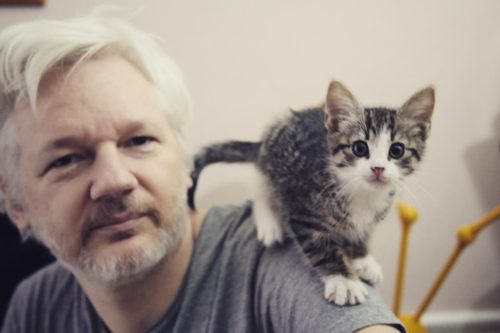Risk
No, this isn’t the board game involving dice and world domination, it’s the latest film by academy award winner Laura Poitras, who brought us the story of NSA-leaker Edward Snowden. Perhaps Citizenfour was too hard an act to follow, but Risk while interesting and at times engaging, in the final calculation, is found wanting. The first hints of this film emerged at a Q&A for Citizenfour I attended with Poitras and Jacob Appelbaum (who features prominently in both films) in attendance where an audience member asked about Wikileaks’ role, to which she replied that there was so much interesting material that she’s considering making an entirely separate documentary about it. And here we are.
while interesting and at times engaging, in the final calculation, is found wanting
The film’s plot centres around the period of time from the immediate aftermath of the so-called Wikileaks cables, to the present day, in roughly chronological order. Those who know me know that I have, for various reasons, followed the Wikileaks story quite closely since its inception, and might be wondering why I would watch a documentary about it. As it was with Citizenfour, another story I followed closely, it’s always interesting to see stories from different perspectives to your own, and there were still some surprises
For those who have seen Citizenfour, the style is familiar – Poitras narrates often with text and sometimes with her own voice while images flash across the screen. Various characters speak, and the style is very conversational – Poitras likes to place the viewer in the conversation rather than as an outsider listening to people being interviewed. The viewer becomes part of the story, and similarly Poitras herself becomes part of the story – literally, and some might say at the expense of the story.
I was surprised by how recent some of the events recounted were. I know a thing or two about film making and how long the process of post-production editing usually takes, and footage from as recently as a few months ago appears in the final cut. That being said, I have also heard from well-placed sources that the film changed significantly in the final months of post-production when stuff happened, and new facts came to light. I have even heard from some of the people who appear in the film that, compared to an earlier cut of the film screened the previous year at Cannes, the cinematic release is very different, especially in the way certain people are portrayed as well as the overall light in which Wikileaks is cast.
That was not the only thing that surprised me. I was also surprised at how little attention was paid to the content of the leaks. In Citizenfour, the main thread which drew the viewer through the film and crystallised the narrative structure was the story of Ed Snowden, how he came to Hong Kong to meet with Poitras, Glenn Greenwald, and Ewan MacAskil, and the aftermath of the leaks. But another major part of the film was the explanations of the leaks themselves and their significance. This lent gravitas to the film – Risk has no such gravitas.
“I thought I could ignore the contradictions. I thought they were not part of the story. I was wrong – they’re becoming the story”
Perhaps this was deliberate. Although it might seem strange that a film about Wikileaks devotes almost no time to talking about the leaks themselves, she says in the trailer that: “I thought I could ignore the contradictions. I thought they were not part of the story. I was wrong – they’re becoming the story”. This tantalising tidbit is, sadly, destined to leave audiences unsatisfied because it doesn’t seem to be addressed. At all.
In terms of getting a different perspective on things I already have knowledge of, the depictions of many of the central characters are inconsistent with what I’ve heard through other sources, sometimes drastically so. On the subject of inconsistencies, I have also learned that the (very normal) contractural obligation of documentary film makers to allow their subjects to review the final cut and request changes or to be taken out completely was not met, or was met with one version of the final cut, only for a very different version to be released. To add insult to injury, I also learned that the film was edited in the US which, considering the sensitive subject matter, is an extremely dangerous thing to do and could have potentially put many of the people involved at… risk.
At the end of the day, this is a film where a handful of people central to Wikileaks and who are close friends of Julian Assange are followed around, and we get to hear their conversations. The narrative structure is not as strong as it was in Citizenfour, and the internal dialogue which motivates the film seems muddled. Some events are presented without much explanation, and non sequiturs abound (there is a bit where Lady Gaga interviews Julian, for example). For those who know very little about Wikileaks and Assange, it is a passably good overview of what happened (although there are a few glaring omissions, like the UN’s decision on his arbitrary detention). For everyone else, the inconsistencies are troubling and one can’t help thinking that a handful of people who trusted Poitras and let them into their inner circles to gather information were thrown under a bus.
Some of the characters are sold short, while others are sold out.
This could have been a very important film. Whether you’ve decided that you like Wikileaks or not, nobody can deny the impact it has had on the today’s world. Instead we have a gossip piece, like the Kardashians except with more interesting characters. Some of those characters are sold short, while others are sold out. Poitras has indeed made a film about inconsistencies, but unwittingly has highlighted her own. Perhaps in her falling out with Assange, she tried to change the central message of the film, but didn’t have enough time to do it properly, so we end up with this. Maybe her judgement was clouded by the fact that she dated one of the central characters. We may never know. What we do know is that Risk is muddled, inconsistent, and untrustworthy, sadly tarnishing the legacy of Citizenfour – a far superior film. The people who are negatively portrayed in the film can take solace from the fact that far fewer people will probably end up bothering to see it.
p.s. there is also no footage whatsoever of the @EmbassyCat, which I found quite disappointing. I have attached a picture below for your viewing pleasure.



Leave a comment